Two New Biographies and a Trove of CDs, by Leonard Lehrman
Comments Off on Two New Biographies and a Trove of CDs, by Leonard LehrmanDecember 23, 2020 by Admin

Two New Biographies and a Trove of CDs
 As 2020 finally comes to a close, and the Trumpandemic winds down and out, it’s time to try catching up with all the books and CDs folks have been generously sending me to review. Eye surgeries and my own concert commitments have prevented me from getting to them until now, for which I apologize. Also for the brevity necessitated by trying to post in time to urge you to consider acquiring some of these items in time for Christmas, or at least New Year’s!
As 2020 finally comes to a close, and the Trumpandemic winds down and out, it’s time to try catching up with all the books and CDs folks have been generously sending me to review. Eye surgeries and my own concert commitments have prevented me from getting to them until now, for which I apologize. Also for the brevity necessitated by trying to post in time to urge you to consider acquiring some of these items in time for Christmas, or at least New Year’s!
Paul Buhle has been an esteemed colleague for decades, specializing in the cultural history of the US Left, and particularly in the until relatively recently underappreciated genre of the graphic novel/graphic biography. The one on Rosa Luxemburg he produced, drawn by Kate Evans in England, was a masterpiece that provided both inspiration and guidance in the composition of my 2019 opera on the subject. His treatment of Eugene V. Debs, with Steve Max, inspired me to revisit and cover Anne Feeney’s wonderful song on that subject at our concert in Madison, Wisconsin a year and a half ago. And his latest, on Paul Robeson, with Lawrence Ware, drawn by Sharon Rudahl, is a tour de force. I read the hardcover in a library copy, and sent Buhle a list of small errors I found, hoping they’d be corrected in a paperback edition, though alas they weren’t, as said edition came out very quickly – I received a press copy. (Maybe there’ll be a second – or third – edition?)
A Graphic Biography of Paul Robeson: Ballad of an American (Rutgers University Press)
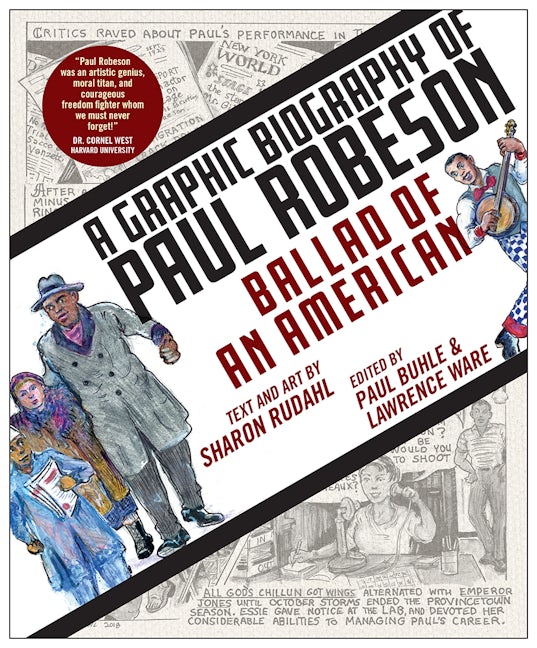 The subtitle of the new book about the African-American football player, singer, actor, and civil rights activist Paul Robeson (1898-1976) is “Ballad of an American,” which was already used in conjunction with composer Earl Robinson (1910-1991) as the title of a 1994 film and his 1997 autobiography, written with Eric A. Gordon, Marc Blitzstein’s first biographer. Unfortunately, though, I don’t see Robinson’s name mentioned anywhere in this book – only the names of two pieces he wrote that were essential Robeson repertoire: “Ballad for Americans” and “The House I Live In.” Another name that goes unmentioned is the great civil liberties attorney Leonard Boudin, who told me he thought he’d be best remembered as the lawyer who got Robeson back his passport, toward the end of the McCarthy era.
The subtitle of the new book about the African-American football player, singer, actor, and civil rights activist Paul Robeson (1898-1976) is “Ballad of an American,” which was already used in conjunction with composer Earl Robinson (1910-1991) as the title of a 1994 film and his 1997 autobiography, written with Eric A. Gordon, Marc Blitzstein’s first biographer. Unfortunately, though, I don’t see Robinson’s name mentioned anywhere in this book – only the names of two pieces he wrote that were essential Robeson repertoire: “Ballad for Americans” and “The House I Live In.” Another name that goes unmentioned is the great civil liberties attorney Leonard Boudin, who told me he thought he’d be best remembered as the lawyer who got Robeson back his passport, toward the end of the McCarthy era.
The Soviet Jewish poet Itzak Feffer, who toured the world in 1943 with actor/director Solomon Michoels (unmentioned here) to raise money for Russian War Relief, is mentioned, and pictured, though the drawing on p. 106 looks a lot more like Michoels than Feffer. As Jr. Division Chair of Russian War Relief in Boston, my mother knew (and interpreted for) them both, and also interviewed Robeson for her Simmons College paper. When I introduced her to Paul, Jr., half a century later, she confessed: “Of course I had a crush on him.” “They all did!” was Paul Jr.’s wry reply. (One of my fondest memories will always be singing “We Shall Overcome” at a 1996 memorial to Alger Hiss, linking arms with my father on my right, Paul Jr. on my left.)
At Robeson Sr.’s last concert in Moscow, June 14, 1949, he sang the Song of the Warsaw Ghetto, “Zog nit keynmol,” dedicating it to Michoels’ memory, over the objection of Soviet authorities. Michoels had been secretly killed by Stalin, Robeson was surreptitiously informed by Feffer, whom Stalin would also kill, in 1952. The recording of the concert still exists, though the dedication was erased. When I was in Moscow in 1985, I sang that song, in Paul Robeson’s version, and numerous older Russian Jews came up to me to say how well they remembered Robeson singing it, and how much it meant to them, in 1949, and again in 1985. My favorite part of the story is how the Russians asked him to sing spirituals but not Jewish songs, because “We don’t have many Jews here.” “Oh really?” replied Robeson. “And do you have many Negroes here?
Speculation was rife for many years that Robeson’s nervous breakdown and collapse may have been CIA-induced. Interesting here is a more probable theory, based on recent scientific studies of latent brain damage from concussions incurred by football players. Despite its flaws, this book is a definite must-read for anyone interested in Robeson, or black history, on any level. Gregory N. Heires wrote a thorough review of it, which I recommend, posted at https://portside.org/2020-10-14/ballad-american.
Humperdinck: A Life of the Composer of Hänsel und Gretel by William Melton, with Foreword by John Mauceri – Toccata Classics, London, England
 Listening to the Met’s radio rebroadcast of the Feb. 2019 performance of Engelbert Humperdinck’s Hansel and Gretel this past Sunday reminded me of how beautiful that music is, also on so many levels, and no matter how well done – as in the Risë Stevens-Nadine Connor-John Brownlee-Thelma Votipka production which was the first opera I ever heard on LP and fell in love with, even before I could talk!; and the wonderful Judith Blegen-Frederica von Stade pairing of the 1980s – nor how badly – as in the current production’s awful translation and insufficiently differentiated voices of the title roles. (The Met’s very first broadcast, in 1931, was also of H&G!). I had the great pleasure of studying (parts of) the work with Boris Goldovsky, and both stage directing and conducting four performances of it in Ithaca, just before getting my Cornell doctorate in 1977. My favorite rehearsal moment came when the children insisted they already knew the music they would have to learn at the end. “Really?” I asked. “And how does it go?” “Ding! Dong! The witch is dead!” “Yip” Harburg and Harold Arlen would have had a fit laughing; Humperdinck might have turned over in his grave, though I think he probably would have laughed too!
Listening to the Met’s radio rebroadcast of the Feb. 2019 performance of Engelbert Humperdinck’s Hansel and Gretel this past Sunday reminded me of how beautiful that music is, also on so many levels, and no matter how well done – as in the Risë Stevens-Nadine Connor-John Brownlee-Thelma Votipka production which was the first opera I ever heard on LP and fell in love with, even before I could talk!; and the wonderful Judith Blegen-Frederica von Stade pairing of the 1980s – nor how badly – as in the current production’s awful translation and insufficiently differentiated voices of the title roles. (The Met’s very first broadcast, in 1931, was also of H&G!). I had the great pleasure of studying (parts of) the work with Boris Goldovsky, and both stage directing and conducting four performances of it in Ithaca, just before getting my Cornell doctorate in 1977. My favorite rehearsal moment came when the children insisted they already knew the music they would have to learn at the end. “Really?” I asked. “And how does it go?” “Ding! Dong! The witch is dead!” “Yip” Harburg and Harold Arlen would have had a fit laughing; Humperdinck might have turned over in his grave, though I think he probably would have laughed too!
An English-language biography of Humperdinck (1854-1921) has been long overdue, and has at last materialized, after a quarter of a century’s labor of love, published by Toccata Classics in London, authored by a US expatriate hornist living in a German-speaking enclave in Belgium, William Melton. Like the Robeson book, I wish I had been sent a copy before it went to press, so that corrections could have been made of numerous small errors (though I confess my own Marc Blitzstein bio-bibliography has even more than this book does!). But in this case, the author wrote me in response to the list I sent him:
“Dr. Lehrman, many thanks for sending your corrections…. I’d begun a shortlist of repairs for a future second edition, but your contributions have lengthened it considerably.”(!)
He also graciously sent me a copy of two unpublished Humperdinck pieces for violin & piano – Notturno and Albumblatt – which Daniel Hyman and I plan to premiere on concerts in 2021. And after I noted that one of Humperdinck’s pupils, Wallingford Riegger, would become the favorite teacher of my teacher, Elie Siegmeister, Melton wrote: “Now I’m in the happy position of expressing my gratitude to the pupil of a pupil of Humperdinck for taking the time to correct the text. Many thanks…”
Errors or no errors, this is one of the most delightful musical biographies, or biographies of any kind, that I’ve ever read. So much research, and so many wonderful stories and insights! How good to know that the practice of casting the witch as a tenor was not one the composer cared for. And that Richard Strauss conducted the 1893 premiere of the work, which would become the only German opera to remain in the international repertoire between Wagner’s Parsifal (which Humperdinck helped prepare) and Strauss’s Salome. The final sestet of a poem by the English poet Kate Freiligrath Kroeker, written in 1895 as a tribute to the opera’s composer, and to his sister, Adelheid Wette, who wrote the libretto, is worth quoting in full:
“And as the music carries me along,
Simple, but wrought with rare and subtle art,
Each well-remembered melody and song
With childhood memories stirs and moves my heart;
Thanks be to you, Brother and Sister, twain,
Whose magic rendered me a child again.”
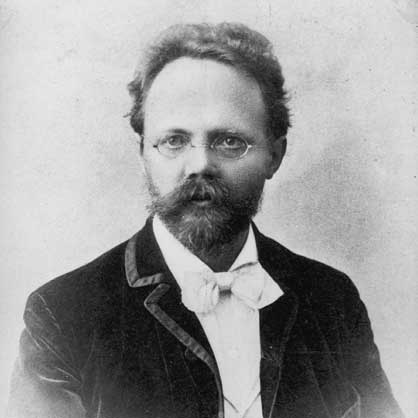 Humperdinck’s own favorite among his works was his Königskinder, another tale of children lost in the forest, except this one ends tragically – not found in time, they freeze to death! How intriguing that the work was accused of expressing “Socialist views”! I remember studying that score in grad school, and three years later practically reliving it, getting caught in a sudden snowstorm near a German castle just before having to rush back and play an opera premiere in Augsburg!
Humperdinck’s own favorite among his works was his Königskinder, another tale of children lost in the forest, except this one ends tragically – not found in time, they freeze to death! How intriguing that the work was accused of expressing “Socialist views”! I remember studying that score in grad school, and three years later practically reliving it, getting caught in a sudden snowstorm near a German castle just before having to rush back and play an opera premiere in Augsburg!
The name of the Metropolitan Opera’s first Hansel, Lina Abarbanell (1879-1963), is misspelled Arbarbanell; moreover, nothing is said about her. This is particularly unfortunate. Although Louise Homer, the Met’s first Witch in both H&G and Königskinder is given a gloss that includes her being the aunt of composer Samuel Barber, it is truly worth noting as well that Abarbanell was the mother-in-law of Marc Blitzstein, whose 1930 ballet Cain was dedicated to Lina’s daughter Eva Goldbeck Blitzstein (1902-1936), and contains a passage which seems to quote from Hansel’s song that begins Act II. Toccata Classics issued the first recording of excerpts from Cain on CD Feb. 1, 2019, (see https://toccataclassics.com/product/marc-blitzstein-piano-music-1918-63/) but that information was apparently not shared with William Melton, at least until now. (Maybe it will be in his next edition?)
Also, at least until now, many of Humperdinck’s lovely songs remain virtually unknown outside of German-speaking lands, for lack of good translations. More on that subject presently.
Gil Rose and The Boston Modern Orchestra Project

Gil Rose and the Boston Modern Orchestra Project (BMOP) have done it again, and again, and again with stunning first recordings of two worthy modern American operas with Odyssey Opera, and an impressive symphonic disk, all by 20th century composers I had the pleasure of knowing, or at least meeting.
 Like William Melton, Gunther Schuller (1925-2015) was an esteemed orchestral hornist – at the Met for many years – before finding his voice as composer, jazz theorist, and administrator, most notably President of New England Conservatory. I was in contact with him when I was Chief Producer at Harvard Radio WHRB, recorded numerous NEC concerts, and met him backstage once, getting his autograph on an LP of his music. I also attended the premiere of his brutal opera The Visitation (1966) starring McHenry Boatwright. The Fisherman and His Wife, a children’s opera written in 1970, while he was at NEC, is just as sophisticated musically as the earlier opera, but much more listener-friendly, with a delightfully pert libretto by John Updike, based, like Hansel and Gretel, on a Grimm fairy tale. Said tale has been the subject of at least four other operas, including Friedrich Klose’s Isebill (1903), mentioned in Melton’s Humperdinck biography, and more recent works by Leon Stein (1955), Susan Bingham (1987), Eda Rothstein Rapoport (1890-1968) (unperformed, as of 1999). The soloists are all winning, particularly tenor Steven Goldstein and mezzo Sondra Kelly in the title roles, but Katrina Galka, Ethan DePuy and David Kravitz all have star turns as the Gardener, the Cat, and the Magic Fish, respectively. The orchestra creates a magical atmosphere that veers from lyric fantasy to stormy terror. For a full review of this CD, see my colleague Ralph Locke’s detailed discussion, with examples, at https://artsfuse.org/202805/opera-cd-review-gunther-schullers-splendid-1970-childrens-opera-gets-its-world-premiere-recording/. More about the disk at https://www.bmop.org/audio-recordings/gunther-schuller-fisherman-and-his-wife.
Like William Melton, Gunther Schuller (1925-2015) was an esteemed orchestral hornist – at the Met for many years – before finding his voice as composer, jazz theorist, and administrator, most notably President of New England Conservatory. I was in contact with him when I was Chief Producer at Harvard Radio WHRB, recorded numerous NEC concerts, and met him backstage once, getting his autograph on an LP of his music. I also attended the premiere of his brutal opera The Visitation (1966) starring McHenry Boatwright. The Fisherman and His Wife, a children’s opera written in 1970, while he was at NEC, is just as sophisticated musically as the earlier opera, but much more listener-friendly, with a delightfully pert libretto by John Updike, based, like Hansel and Gretel, on a Grimm fairy tale. Said tale has been the subject of at least four other operas, including Friedrich Klose’s Isebill (1903), mentioned in Melton’s Humperdinck biography, and more recent works by Leon Stein (1955), Susan Bingham (1987), Eda Rothstein Rapoport (1890-1968) (unperformed, as of 1999). The soloists are all winning, particularly tenor Steven Goldstein and mezzo Sondra Kelly in the title roles, but Katrina Galka, Ethan DePuy and David Kravitz all have star turns as the Gardener, the Cat, and the Magic Fish, respectively. The orchestra creates a magical atmosphere that veers from lyric fantasy to stormy terror. For a full review of this CD, see my colleague Ralph Locke’s detailed discussion, with examples, at https://artsfuse.org/202805/opera-cd-review-gunther-schullers-splendid-1970-childrens-opera-gets-its-world-premiere-recording/. More about the disk at https://www.bmop.org/audio-recordings/gunther-schuller-fisherman-and-his-wife.
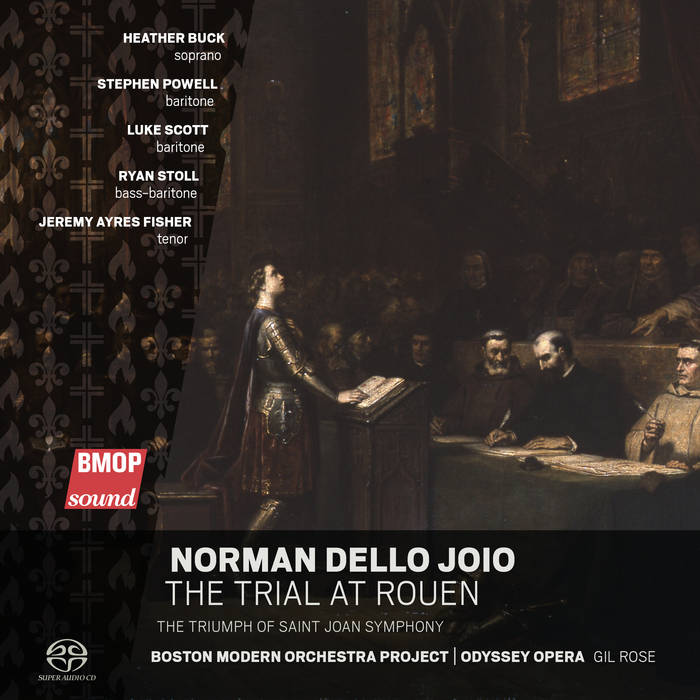 Norman Dello Joio (1913-2008) was another composer I had the pleasure of meeting, a little less briefly, in a hotel lobby in Moscow where he was one of the oldest and I one of the youngest delegates to the International Music Congress in October 1971. Radio Moscow decided to interview us jointly, which was delightful. With The Trial at Rouen and a supplementary Triumph of Saint Joan Symphony, Dello Joio took on a subject that had been turned into many masterpieces before him – by Verdi, Tchaikovsky, Honegger, Shaw and Brecht, to name just a few. In 1950 he worked on a libretto with Joseph Machlis (creator of the English translation for another story of French martyrdom, Poulenc’s Dialogues of the Carmelites, that the Met still uses); but dissatisfied, ended up transforming the opera’s first version into a symphony in 1951, and then writing his own libretto for another version, for NBC in 1955. The net result is quite personal, expressive, and often beautiful. I would have liked to have heard Elaine Malbin in the original in the TV premiere, conducted by Peter Herman Adler. A marvelous performer, she was a featured soloist with Cantor Seymour Schwartzman in my first synagogue concert at Roslyn’s Temple Beth Sholom in 1987, and I kept hoping, during my 10 years at Jericho Jewish Center, that she would be invited to speak at a dinner and play videos of her performances. But that never happened. Maybe, before it’s too late, some other organization will find funds to do that. Meanwhile, Heather Buck is quite effective in the title role on this recording, as are Stephen Powell, Luke Scott, Ryan Stoll and Jeremy Ayres Fisher in supporting roles. And the orchestra, again, packs a punch. More CD information at https://www.bmop.org/audio-recordings/norman-dello-joio-trial-rouen.
Norman Dello Joio (1913-2008) was another composer I had the pleasure of meeting, a little less briefly, in a hotel lobby in Moscow where he was one of the oldest and I one of the youngest delegates to the International Music Congress in October 1971. Radio Moscow decided to interview us jointly, which was delightful. With The Trial at Rouen and a supplementary Triumph of Saint Joan Symphony, Dello Joio took on a subject that had been turned into many masterpieces before him – by Verdi, Tchaikovsky, Honegger, Shaw and Brecht, to name just a few. In 1950 he worked on a libretto with Joseph Machlis (creator of the English translation for another story of French martyrdom, Poulenc’s Dialogues of the Carmelites, that the Met still uses); but dissatisfied, ended up transforming the opera’s first version into a symphony in 1951, and then writing his own libretto for another version, for NBC in 1955. The net result is quite personal, expressive, and often beautiful. I would have liked to have heard Elaine Malbin in the original in the TV premiere, conducted by Peter Herman Adler. A marvelous performer, she was a featured soloist with Cantor Seymour Schwartzman in my first synagogue concert at Roslyn’s Temple Beth Sholom in 1987, and I kept hoping, during my 10 years at Jericho Jewish Center, that she would be invited to speak at a dinner and play videos of her performances. But that never happened. Maybe, before it’s too late, some other organization will find funds to do that. Meanwhile, Heather Buck is quite effective in the title role on this recording, as are Stephen Powell, Luke Scott, Ryan Stoll and Jeremy Ayres Fisher in supporting roles. And the orchestra, again, packs a punch. More CD information at https://www.bmop.org/audio-recordings/norman-dello-joio-trial-rouen.
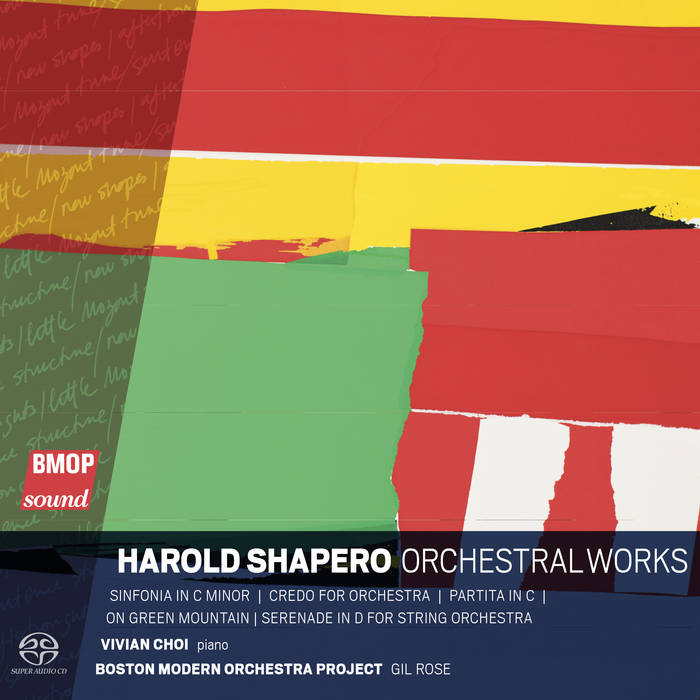 The orchestra plays all by itself in five works (Sinfonia, Credo, Partita, On Green Mountain, and Serenade) by Brandeis faculty composer and Nadia Boulanger acolyte Harold Shapero, whom I also knew, fairly well in fact, having recorded, archived, and narrated a program devoted entirely to his music on WHRB for his 50th birthday year, 1970. By that time he was gravitating to electronic experimentation, using the Buchla Synthesizer – also the choice instrument of one of my teachers at Harvard, Leon Kirchner, and Shapero’s own daughter Hannah, who became an expert at what she called “Buke Puke.” The works on this CD are all from much earlier, 1945 to 1960, and gracefully espouse the neo-classicism Boulanger favored (along with Stravinsky, in his middle period), with one 10-minute side-excursion into a jazz idiom somewhat more bucolic than Schuller’s. Vivian Choi is the capable soloist in the most recent of the works, which range from playfully energetic to serene. It’s at http://bmop.org/audio-recordings/harold-shapero-orchestral-works.
The orchestra plays all by itself in five works (Sinfonia, Credo, Partita, On Green Mountain, and Serenade) by Brandeis faculty composer and Nadia Boulanger acolyte Harold Shapero, whom I also knew, fairly well in fact, having recorded, archived, and narrated a program devoted entirely to his music on WHRB for his 50th birthday year, 1970. By that time he was gravitating to electronic experimentation, using the Buchla Synthesizer – also the choice instrument of one of my teachers at Harvard, Leon Kirchner, and Shapero’s own daughter Hannah, who became an expert at what she called “Buke Puke.” The works on this CD are all from much earlier, 1945 to 1960, and gracefully espouse the neo-classicism Boulanger favored (along with Stravinsky, in his middle period), with one 10-minute side-excursion into a jazz idiom somewhat more bucolic than Schuller’s. Vivian Choi is the capable soloist in the most recent of the works, which range from playfully energetic to serene. It’s at http://bmop.org/audio-recordings/harold-shapero-orchestral-works.
Edward Smaldone: Once and Again (https://newfocusrecordings.bandcamp.com/album/once-and-again) and Double Portrait with Douglas Knehans (https://www.douglasknehans.com/cds/ar-00053-knehans-smaldone-double-portrait)
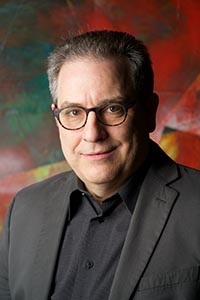 Ed Smaldone (b. 1956) is a good friend whose music I had the pleasure of playing at Hofstra with Todd Reynolds over two decades ago, and who served as Vice President for the second of my three and a half terms as President of The Long Island Composers Alliance (1991-98). Declining to become President of the organization (“I dodged that bullet” were his words on that, later), he became Director of the Aaron Copland School of Music at Queens College CUNY for many years, and was extremely helpful supporting our 2015 English-language premiere there of Dargomyzhsky’s opera Rusalka, in memory of my mother, who had translated it with me. While we were in rehearsal, the Provost changed school policy, and was about to charge us an arm and a leg rental, but Ed stood up for us, for which we’ll always be grateful. (See http://helenewilliamsspierman.homestead.com/Rusalka_Index.html.)
Ed Smaldone (b. 1956) is a good friend whose music I had the pleasure of playing at Hofstra with Todd Reynolds over two decades ago, and who served as Vice President for the second of my three and a half terms as President of The Long Island Composers Alliance (1991-98). Declining to become President of the organization (“I dodged that bullet” were his words on that, later), he became Director of the Aaron Copland School of Music at Queens College CUNY for many years, and was extremely helpful supporting our 2015 English-language premiere there of Dargomyzhsky’s opera Rusalka, in memory of my mother, who had translated it with me. While we were in rehearsal, the Provost changed school policy, and was about to charge us an arm and a leg rental, but Ed stood up for us, for which we’ll always be grateful. (See http://helenewilliamsspierman.homestead.com/Rusalka_Index.html.)
 So it’s my pleasure, at least to some extent, to report that at least one of his new CDs is very satisfying in its diversity, expressivity and energy. That’s his portion of the Double Duo album produced by his colleague at the University of Cincinnati College Conservatory, Douglas Krehans (b. 1957). I particularly enjoyed the 3 piano pieces entitled Scenes from the Heartland, which I recall Donald Pirone playing on a LICA concert back in the 1990s. And his attractive Double Duo for flute, clarinet, violin and cello receives distinctive and distinctly different interpretations from two different groups of instrumentalists, one on each of these two recordings. Jazzy improvisations inspired by Duke Ellington and Thelonius Monk are also a feature of the solo album. As for Krehans’s music, it too is creative, but I was unfortunately reminded too much of how Edgard Varèse’s “Amériques” was once banned from the radio because of its sirens. Listening to his opening “Bang” for sextet and electronics while driving in my car, I kept worrying that the siren noises might be coming from an unmarked police car following me! So I can’t exactly recommend listening to it, at least in the car!
So it’s my pleasure, at least to some extent, to report that at least one of his new CDs is very satisfying in its diversity, expressivity and energy. That’s his portion of the Double Duo album produced by his colleague at the University of Cincinnati College Conservatory, Douglas Krehans (b. 1957). I particularly enjoyed the 3 piano pieces entitled Scenes from the Heartland, which I recall Donald Pirone playing on a LICA concert back in the 1990s. And his attractive Double Duo for flute, clarinet, violin and cello receives distinctive and distinctly different interpretations from two different groups of instrumentalists, one on each of these two recordings. Jazzy improvisations inspired by Duke Ellington and Thelonius Monk are also a feature of the solo album. As for Krehans’s music, it too is creative, but I was unfortunately reminded too much of how Edgard Varèse’s “Amériques” was once banned from the radio because of its sirens. Listening to his opening “Bang” for sextet and electronics while driving in my car, I kept worrying that the siren noises might be coming from an unmarked police car following me! So I can’t exactly recommend listening to it, at least in the car!
 Another LICA composer, Allen Brings (b. 1934), whose music for piano and for chorus I’ve had the pleasuring of playing and conducting, in recital and in church, has a new recording out on Navona – “3 Lais,” for a cappella flute, part of a collection of contemporary flute works by 8 composers entitled “Aero,” assembled and performed by Dieter Flury and assisting instrumentalists. Brings’ work runs a wide gamut of emotions in a small time space; the other works are quite listenable too – https://www.navonarecords.com/catalog/nv6296/.
Another LICA composer, Allen Brings (b. 1934), whose music for piano and for chorus I’ve had the pleasuring of playing and conducting, in recital and in church, has a new recording out on Navona – “3 Lais,” for a cappella flute, part of a collection of contemporary flute works by 8 composers entitled “Aero,” assembled and performed by Dieter Flury and assisting instrumentalists. Brings’ work runs a wide gamut of emotions in a small time space; the other works are quite listenable too – https://www.navonarecords.com/catalog/nv6296/.
Prokofiev, Shostakovich, Two Tcherepnins
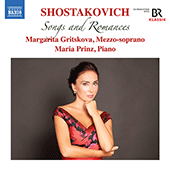 I mentioned earlier the desirability of singable translations. In 1973-76, at Cornell, I wrote translations that could be sung in English of a number of Russian texts, for music by Modeste Moussorgsky, Dmitri Shostakovich, and myself. (My latest project, finished just months before the death of Sergei Slonimsky last February, was a translation back into English of his opera King Lear, on a libretto based on Boris Pasternak’s Russian translation of the Shakespeare play. And I’ve just completed a singing translation of Shlomo Artzi’s Hebrew song “Ha’ish Hahu,” associated with Yitzchak Rabin.) My Shostakovich translations were of his settings of Satires, opus 109, by Sasha Tschorny. Two of these translations of mine, I was pleased to learn,
I mentioned earlier the desirability of singable translations. In 1973-76, at Cornell, I wrote translations that could be sung in English of a number of Russian texts, for music by Modeste Moussorgsky, Dmitri Shostakovich, and myself. (My latest project, finished just months before the death of Sergei Slonimsky last February, was a translation back into English of his opera King Lear, on a libretto based on Boris Pasternak’s Russian translation of the Shakespeare play. And I’ve just completed a singing translation of Shlomo Artzi’s Hebrew song “Ha’ish Hahu,” associated with Yitzchak Rabin.) My Shostakovich translations were of his settings of Satires, opus 109, by Sasha Tschorny. Two of these translations of mine, I was pleased to learn, have just appeared in the printed notes of an album of Shostakovich songs (https://www.naxos.com/catalogue/item.asp?item_code=8.574031), beautifully sung (in the original Russian) and played by mezzo Margarita Gritskova and pianist Maria Prinz, who sent it to me, along with their Prokofiev album (https://www.naxos.com/catalogue/item.asp?item_code=8.574030), likewise beautifully produced, on Naxos.
The only drawback to both discs is the omission of the texts for 8 or 9 selections on each of the albums, not because they don’t exist (in fact some are quite findable on the internet), but “for copyright reasons.”
My Moussorgsky translation was of his setting of the first act of Nikolai Gogol’s play Zhenit’ba, “The Marriage,” or “Getting Married.” This is a wonderful play my wife and I got to see in Moscow when we were there recording my Russian songs in 2016. In April 1973, as I played Moussorgsky’s music on the piano underneath, I got to hear my words spoken, in Readers’ Theatre Melodrama style, by Professors George Gibian and William Austin, and (then) grad students Laurel Fay and Jerry Amaldev. But Mussorgsky set only the first act. Three other composers wrote music for the other acts, including Alexander Tcherepnin, who condensed Gogol’s Acts II & III into one act, so the work would be half-Moussorgsky and only half (not 2/3) Tcherepnin. In 1977, just months before his death in Paris, having heard about my work from William Austin, he came to my apartment in Manhattan and asked me to write an English translation to be sung to his music. My mother wrote a literal translation of it, and it has been waiting for me to get to it. I know the completion is good, because I saw a very entertaining production of it in Oberhausen, Germany, in German, in the 1980s.
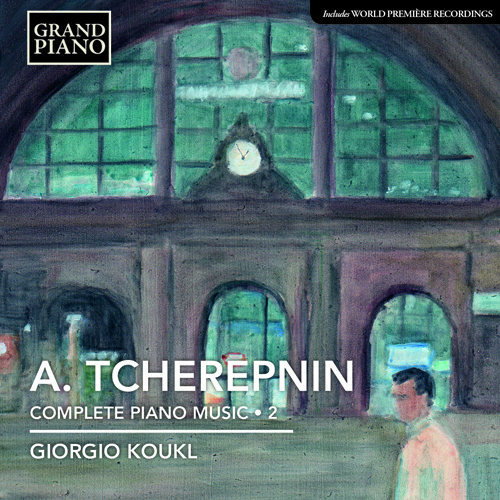 Considerable motivation to throw myself into that project has been stimulated by the Tcherepnin Foundation, which has sent me 8 (eight!) CDs comprising Giorgio Koukl’s brilliant playing of Alexander’s Complete Piano Music, complementing Toccata Classics’s magnificent CDs of a recently assembled song cycle on poems by Sergei Gorodetsky by a very young Alexander and a wide range (1900-1923) of songs in Russian by his father Nikolai. Lyric soprano Elena Mindlina glitters in the father’s songs with pianist David Witten. Dramatic soprano Inna Dukach, with pianist Tatyana Kebuladze, shines, singing all but two of the 37 songs in My Flowering Staff; #17 is performed by bass Paul Whelan with the Acmeist Male Choir – a weird change of color, but appropriate to the text – and #23 is a piano solo. The albums all make for thrilling listening, and do contain translations, though not singing ones. More about them at https://grandpianorecords.com/Album/AlbumDetails/GP635.
Considerable motivation to throw myself into that project has been stimulated by the Tcherepnin Foundation, which has sent me 8 (eight!) CDs comprising Giorgio Koukl’s brilliant playing of Alexander’s Complete Piano Music, complementing Toccata Classics’s magnificent CDs of a recently assembled song cycle on poems by Sergei Gorodetsky by a very young Alexander and a wide range (1900-1923) of songs in Russian by his father Nikolai. Lyric soprano Elena Mindlina glitters in the father’s songs with pianist David Witten. Dramatic soprano Inna Dukach, with pianist Tatyana Kebuladze, shines, singing all but two of the 37 songs in My Flowering Staff; #17 is performed by bass Paul Whelan with the Acmeist Male Choir – a weird change of color, but appropriate to the text – and #23 is a piano solo. The albums all make for thrilling listening, and do contain translations, though not singing ones. More about them at https://grandpianorecords.com/Album/AlbumDetails/GP635.
by Leonard Lehrman, Copyright 2020
This is Leonard Lehrman’s 27th article for SoundWordSight.com. His most recent concerts, presented on Zoom, may be accessed at https://tinyurl.com/2Oct2020 (Songs on Poems by Long Islanders, with Helene Williams & Michael Niemann, presented by the Walt Whitman Birthplace) and https://tinyurl.com/13Dec2020 (The Beethoven Semiquincentennial Concert, with Helene Williams & The Dakule Trio, presented by Oyster Bay, Valley Stream & Long Beach Libraries). His next concert, Jan. 12, 2021 will feature Bach, Beethoven, Brahms and Siegmeister, including a collaboration with poet Kim Rich, who will be present, and who collaborated with him on 2 songs in 2020, which won more votes than any other submissions in Round 5 of the York Theatre Songwriters in Mufti Competition. Website: www.ljlehrman.artists-in-residence.com.
Category Sight, Sound, Word | Tags:
Comments Off on Two New Biographies and a Trove of CDs, by Leonard Lehrman
Sorry, comments are closed.

